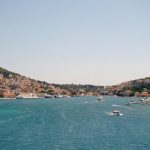How I Traveled Europe On A Budget
Thanks to careful planning I was able to spend eleven weeks traveling through Europe this past summer. I had just graduated college and wasn’t going to waste this chance to see some of the world. Over the course of my final year at school my girlfriend and I started making plans for a trip that summer. During our weekly Skype chat we mapped out our route. I would fly into Dublin in mid-June and spend a few weeks with her and her family before we left for Europe. We picked countries that neither of us had ever been to and started in Prague, Czech Republic. From there we would make our way south through Austria, Slovenia, Croatia, hop over to Italy for a night and finish in Athens. That would take us through July and the first week of August before we would fly back to Dublin and spend the rest of the summer around Ireland.
It only took about 6 months to get money together in order to make this possible. My senior year of college I was living in an apartment in Cambridge, MA which made it difficult to save while paying rent, bills, grocery shopping and having fun occasionally. I needed to work during school in order to make ends meet but by forsaking weekend trips to visit friends or going to pricey bars it was possible to take a small portion of my paycheck every week and transfer it to my savings account. In the spring I knew I would be getting my tax refund as well, all of which went towards my trip. Every year I took out a bit of excess money in my student loans to cover some expenses but by saving that I could take that $1000 each semester and keep that for Europe. Finally, when school let out in May I moved home and found landscaping work before leaving in June. This afforded me to get any last minute items for my trip and extra spending money. All of this combined netted me about $4000 that I would have to spread out over two and a half months. By traveling on a budget I was able to do this with $900 to spare at the end of it.
Plan Ahead
This is by far the most obvious and helpful bit of advice for traveling on a budget. In a perfect world every travel experience would involve getting up and going with no time line or final destination but often times this is not the case. Planning ahead doesn’t wipe out all spontaneity by any means. You don’t have to ration out every meal and tour but it’s a good idea to pick a start and ending destination then fill in the blanks. My girlfriend and I did just that. We got out the map and picked Prague in the north and Athens in the south. That allowed us to book airfare far in advance and then we could do research to plot our route to get from A to B.
Hostels and airlines often raise prices as time to departure becomes shorter so it’s best to book early and save as much as possible. We were able to get direct peak season flights to and from Dublin directly for roughly $250 by booking many months in advance. This was before we learned the secrets of credit card bonuses from Free Travel Genius (we would not have used airline points for something so cheap, but the bonus from one Chase Sapphire Card would have paid for both of our flights with room to spare). For hostels the biggest risk is having them fill up and the cheap ones tend to go first. We ran into this booking 5 months in advance and ended up having to stay in 6-bed dorms instead of private rooms or having to move well outside of the city away from public transportation because we weren’t quick enough. At the very least having rooms booked in advance is a great mental boost. A five hour bus ride will probably leave you tired, uncomfortable, hungry or having to use the bathroom so it can be a relief knowing that even though you have to put your on backpack again at least you’re walking towards your bed and don’t have to worry about overpaying or being turned away.
Having hostels, flights and anything else in advance will give you a much better chance of where you stand financially. A couple of days before my flight to Dublin my back account had about $4,000 in it and I knew that $800 of that had to be given to my girlfriend immediately to repay her. That $800 included all flights, ferries and hostels. Now I could better plan my funds for food, bars, buses, souvenirs and anything else would come up along the way.
Transportation
Flights
Just to reiterate, book in advance. Many Europeans spend time traveling during the summer months so flights fill up quickly and prices often rise drastically as the dates approach. We had our flights booked about four months in advance and even then that cost us more than it would have had we done it a month sooner. Airlines like Ryan Air offer significantly cheaper airfare than other, bigger name airlines by getting rid of some of the frills like complimentary drinks or seat allocation. When your flight isn’t going to last more than a couple of hours these things really are insignificant anyway. One great thing about Ryan Air is they fly into cities both large and small. So whether you’re going to some of the more popular destinations like Paris or Barcelona or exploring some lesser-known locations like Riga, Latvia, a discount carrier (such as Ryan Air, Easy Jet, Air Berlin or others) can get you there on the cheap.
Bus
– The often-discussed Eurail currently costs about $300 for use in up to 5 countries. I was able to through my entire trip for half of that by taking. Upon arriving in a new city we’d research both train and bus options considering both time and money; only twice out of nine trips did we decide on the train. The trains would usually be traveling indirectly and would cost on average three times as much as the bus. Only once did we pay more than 20 Euros and only once was there a train ticket for the same price as the bus. Not once did we run into problems with scheduling or timing with any bus company. Also, if you’re concerned with passing up scenic views don’t be. We saw many beautiful landscapes including fields of sunflowers and wind farms on our way to Vienna and countless seaside towns dotting the Croatian coast. Note: There are the occasional baggage fees but these never went past $3 USD.
- Prauge to Vienna – 16 EUR, 5 hours
- Bled to Ljubljana – 7 EUR, 1.5 hours. Buses depart almost hourly from the bus station in Bled. Note: When selecting a destination in Ljubljana select “Ljubljana Avtobusna Postaja”
- Croatia by Bus – Croatians are proud of their widespread and reliable bus routes.
- Living Greece has a comprehensive list of bus routes within Greece however, they have an insecure link (livingingreece.gr/2008/06/13/ktel-buses-of-greece), use at your own risk.
Ferry
There was no debate in Croatia that a ferry was the only way to get out to Hvar but getting to Greece we had options. There were two overnight ferries, one to Bari, Italy and another to Igoumenitsa, Greece or navigate bus routes through Bosnia, Montenegro and Albania. Between visa issues, complicated bus routes, frequent changes and language barriers we assumed the ferry would be easiest and it certainly was. But, if there’s any time you’re going to want to travel lavishly its on a long ferry ride. It is no fun sitting on an outdoor deck in the pouring rain when you know there are people asleep in their cabins. Your best bet without a cabin is to find a bench to curl up on. Even then you’re faced with lights, noise and vibrations on an uncomfortable makeshift bed.
- Jadrolinija – Services many cities throughout Croatia
- Direct Ferries – Directory of ferry companies operating in Europe and North Africa
Accommodations
Hostels
Easily your best bet for budget traveling. Hostels come in all shapes and sizes as well. There are the party hostels where everyone is packed together as tightly as can be and are usually feature their own bar, club or roof deck for self contained partying. If you find this primitive and depressing as I do, or it simply isn’t your thing, try looking for smaller places outside of the heart of the city. This usually means cheaper prices, peace and quiet, a bit of personal space and cleaner facilities. A huge plus of the hostels we chose was that many came with fully stocked kitchens. Budgeting and having to eat out gets redundant after a while, so for the same cost as some pasta or kebab, we could cook up fresh vegetables or make chicken alfredo. We were able to average around 15 Euro per night in all of our hostels and had private rooms on all but two occasions. Hostel World and Hostel Bookers are the two most used and comprehensive websites. Both will give you rates, maps and reviews.
Guesthouses
Often times the “hostels” that we booked turned out to be spare rooms in people’s homes. Our best stay was with an amazing family in their home outside of Bled, Slovenia. We had a private room, shower, transport to and from the bus station and lake, cooked breakfast awaiting us every morning and met some of the nicest people I’ve ever known. This is a great way to get advice and tips from locals who are always more than willing to accommodate their guests. This type of stay does come with a need for more respect than someone would give a hostel but if this sounds more appealing than the aforementioned party hostel that probably isn’t an issue anyway.
Food and Drink Tips
Self-Cater
– While this will not always be an option, if you are staying somewhere with a kitchen (such as most proper hostels) or even just a refrigerator, take advantage. Fresh fruit or bread with jam is never going to be a disappointing breakfast and are very easy to transport for snacks in the afternoon. Speaking of which, keeping some granola, fruit, trail mix or any kind of snack on hand will come in handy when you need a little more energy in the middle of the day or in between meals.
Whether it’s at the grocery store or local market you’ll most likely be able to get your hands on some cheap and delicious vegetables, meat, poultry or whatever you fancy for dinner. If you’re fortunate enough to have access to a kitchen and won’t burn down the hostel that home cooked dinner will be just as good as going out. It’s nice to sample the local wares but this can be done by grabbing a quick bite just as easily as at a sit-down restaurant.
Get a Water Bottle
You can never be sure when you’re going to come across cold, drinkable water next so a water bottle can be a lifesaver and save you a ton on bottled water. Fill up in the morning and keep an eye out for drinking fountains and you’ll be fine. Between the heat and copious amounts of walking you can never have enough of the good stuff. At 2 Euro a piece plastic bottles can start to add up and are bad for the environment to boot. A $4-$15 investment before you leave can save you a lot of frustration, money and dehydration. Consider bringing one that covers the mouthpiece, you will be traveling a lot and don’t want that to get dirty. Also, make sure to wash it every few days.
Bars and Clubs
While many younger travelers will probably want to experience the European club scene at some point along the way, do it too often and you can run through your budget in short order. For financial sake, and to avoid the abhorrent (in my opinion) club culture, bars and smaller venues often prove to be the best. These places are often just as social as any nightclub without the groping, house music and ratty backpackers. It seems counterintuitive in the summer to spend the night indoors when so many bars and restaurants offer outdoor seating anyway. This allows for a great chance to chat up the locals, try some regional beers and have a good time with the people you’re traveling with and new people you meet. You can also check with your hostel for the cheapest way to spend the evening. There is always some sort of pub-crawl, student night, happy hour or somewhere to get a cheap drink and enjoy the nightlife.
Matthew
MATTHEW'S BACKPACKING BLOG
Austria Budget Czech Republic Eurail Europe Greece Italy Ryan Air Slovenia Travel





